七年级英语下册 Unit1 Where is your pal from _ section A 一套课件人教版新目标
英语教学课件-七年级英语下Unit1_Where_is_your_pen_pal_from
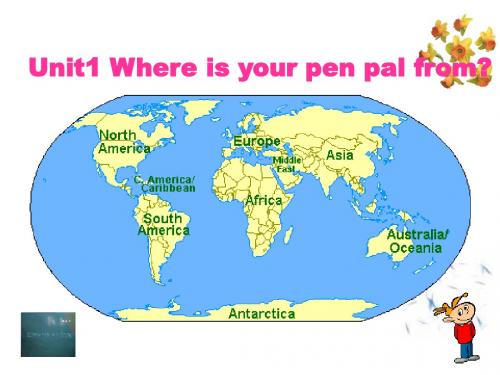
France Canada Japan
2c
Unit 1 Where’s your pen pal from?
Listen again and complete the chart.
Name
City
Country
John Jodie
Tokyo Paris
Japan France
Andrew Sydney Australia
the United Kingdom
London
Where is your pen pal from? He’s/She’s from… Where does he/she live? He/she lives in …
France
Paris
Where is your pen pal from? He’s/She’s from… does he/she live? He/she lives in … Where
Make a survey
Classmate
Chen Wei
Pen pal
Country
City
Language
Jodie France Paris French
Report: Chen Wei’s pen pal Jodie is from France. She lives in Paris . She speaks French.
Tokyo
pen
Where is your pen pal from? He’s/She’s from… Where does he/she live? He/she lives in …
the United States
New York
七下unit1where’syourpenpalfrom课文

七下unit1where’syourpenpalfrom课文摘要:1.课文概述2.课文主题:询问并描述某人的朋友来自哪里3.课文结构:对话形式4.语言点:疑问词和回答方式5.对话内容:询问朋友的朋友来自哪里,以及对此的回答正文:一、课文概述本篇课文为英语课程七年级下册第一单元的对话课,主题为询问并描述某人的朋友来自哪里。
课文采用对话形式,以两个角色之间的问答为主线,旨在让学生学会用英语询问和描述某人的朋友来自哪里。
二、课文主题:询问并描述某人的朋友来自哪里本篇课文的主题是询问并描述某人的朋友来自哪里。
课文通过角色间的对话,让学生学会如何用英语询问和描述某人的朋友来自哪里,以及如何回答此类问题。
三、课文结构:对话形式课文采用对话形式,分为两个角色,A 和B。
A 向B 询问其朋友的朋友来自哪里,B 回答说其朋友的朋友来自英国。
然后A 对此回答表示惊讶,并表示自己的朋友也来自英国。
通过这个对话,学生可以学习到如何用英语询问和描述某人的朋友来自哪里,以及如何回答此类问题。
四、语言点:疑问词和回答方式本篇课文的语言点是疑问词和回答方式。
疑问词如"Where"s","from"等,用于询问某人的朋友来自哪里。
回答方式如"He"s from..."、"She"s from..."等,用于描述某人的朋友来自哪里。
五、对话内容:询问朋友的朋友来自哪里,以及对此的回答在对话中,A 向B 询问其朋友的朋友来自哪里,B 回答说其朋友的朋友来自英国。
然后A 对此回答表示惊讶,并表示自己的朋友也来自英国。
这个对话让学生学会如何用英语询问和描述某人的朋友来自哪里,以及如何回答此类问题。
(word完整版)人教版英语七年级下学期1-12单元句子翻译专练及答案
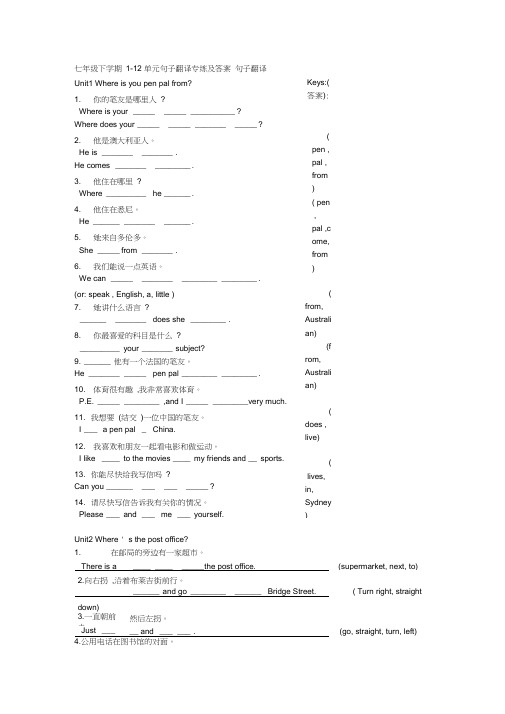
七年级下学期1-12 单元句子翻译专练及答案句子翻译Unit1 Where is you pen pal from?1. 你的笔友是哪里人?Where is your _____ _____ __________ ?Where does your _____ _____ _______ _____ ?2. 他是澳大利亚人。
He is _______ _______ .He comes _______ ________ .3. 他住在哪里?Where _________ he ______ .4. 他住在悉尼。
He ______ _______ ______ .5. 她来自多伦多。
She _____ from _______ .6. 我们能说一点英语。
We can _____ _______ ________ ________ .(or: speak , English, a, little )7. 她讲什么语言?______ _______ does she ________ .8. 你最喜爱的科目是什么?_________ your _______ subject?9. ______ 他有一个法国的笔友。
He _______ _____ pen pal ________ ________ .10. 体育很有趣,我非常喜欢体育。
P.E. _____ ________ ,and I _____ ________ v ery much.11. 我想要(结交)一位中国的笔友。
I ___ a pen pal _ China.12. 我喜欢和朋友一起看电影和做运动。
I like ____ to the movies ____ my friends and __ sports.13. 你能尽快给我写信吗?Can you ______ ___ ___ _____ ?14. 请尽快写信告诉我有关你的情况。
Please ___ and ___ me ___ yourself.Unit2 Where ' s the post office?1. 在邮局的旁边有一家超市。
七年级下册英语复习素材

新目标七年级英语下册重点知识点复习Unit 1 Where is your pal from?1.(p1)be from =come from 来自Linda is from Japan.= Linda comes.from Japan.那么Where's your pen pal from?= ?2.(p2)live住,居住(后跟地点是常用live in) 。
例如:I live in China. Do you live in China? Yes,Ido./No,Idon't.I don'tlive in China. Where do you live? (where 是副词,和动词live搭配时,动词后不能加介词in)3.(p3)说某种语言用speak, speak Chinese/ English/ Japanese /French说汉语/英语/日语/法语问某人说某种语言用句型What language do/does sb speak?What language do you speak?I speak Chinese.What language does Mary speak?She speaks English.4.(p5,3a)14 years old 14岁解释:数字+ year(s) old …岁当数字大于1时,year用复数years。
I am 30 years old. Her son is 1 year old.5.(p5,3a)can为情态动词,“能,能够,会”。
后面跟动词时必须用动词原形。
肯定句变成一般疑问句需把can提到句首。
肯定句变成否定句只需把can变成can't 既可。
例如:She can speak English. Can she speak English? Yes,she can./No,she can't .She can't speak English.6(p5,3a)“Like+动词ing”表示“喜欢做某事”I like playing basketball.Tom likes listening to music.注意:“Like+to+动词”也表示“喜欢做某事”,仅仅“Like+动词ing”表示习惯性动作(也能够说是爱好),而“Like+to+动词”表示一次性或短暂性的。
新目标七年级英语下册Unit1 Where's your pen pal from ?讲解与练习

第1页(共4页) 第2页(共4页)学校 班级 姓名 考场 考号 座位号 号--------------------------------○密--------------------------------------○封------------------------------------○线----------------------※※※※※※※※※※※※※※※答※※※※※※※※※※※※※※※※※※题※※※※※※※※※※※※※※※※※线※※※※※※※※※※Unit 1 Where ’s your pen pal from?讲解与练习讲解一.短语:1、 be from = come from 来自于---- She is from France. 她来自法国。
=She comes from France.2、 live in 居住在--- I live in China.我住在中国。
3、 in China 在中国4、 write to sb = write a letter to sb 给某人写信;写信给某人5、 in the world 在世界上 There are many countries in the world.世界上有许多国家。
6、 pen pal 笔友 I have two pen pals. 我有两位笔友。
7、 on weekends 在周末8、 14 years old 14岁9、 New York 纽约 10、 favorite subject 最喜欢的科目 11、 the United States 美国 12、 the United Kingdom 英国 13、 speak English 讲英语 14、 like and dislike 爱憎 15、 go to the movies 去看电影 16、 play sports 做运动 二.重点句式:1、Where+be+主语+from? (询问”某人来自哪里”或”某人是哪里的人”,当主语是物品时,则表示“此物产于何地”) 回答句型:主语+be+from+地点。
人教版七年级下册英语书
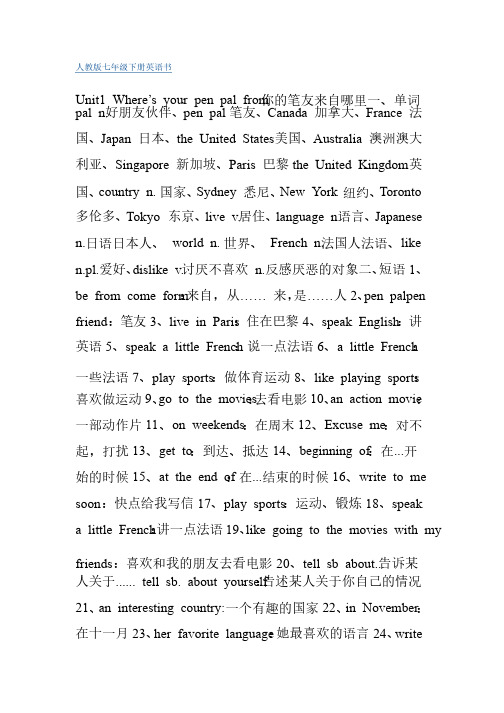
人教版七年级下册英语书Unit1 Where’s your pen pal from 你的笔友来自哪里一、单词pal n.好朋友伙伴、好朋友伙伴、pen pal 笔友、Canada 加拿大、France 法美国、Australia 澳洲澳大国、Japan 日本、the United States 美国、利亚、Singapore 新加坡、Paris 巴黎the United Kingdom 英国、country n. 国家、Sydney 悉尼、New York 纽约、Toronto 多伦多、Tokyo 东京、live v.居住、语言、Japanese 居住、language n.语言、n.日语日本人、法国人法语、like 日语日本人、 world n. 世界、世界、 French n.法国人法语、n.pl.爱好、dislike v.讨厌不喜欢讨厌不喜欢 n.反感厌恶的对象二、短语1、讨厌不喜欢be from come form:来自,从…… 来,是……人2、pen palpen friend:笔友3、live in Paris:住在巴黎:住在巴黎4、speak English:讲英语5、speak a little French:说一点法语6、a little French:一些法语7、play sports:做体育运动8、like playing sports:喜欢做运动9、go to the movies:去看电影10、an action movie:一部动作片11、on weekends:在周末12、Excuse me:对不起,打扰13、get to:到达、抵达14、beginning of:在...开始的时候15、at the end of:在...结束的时候16、write to me soon:快点给我写信17、play sports:运动、锻炼18、speak a little French:讲一点法语19、like going to the movies with my friends:喜欢和我的朋友去看电影20、tell sb about...告诉某人关于...... tell sb. about yourself:告述某人关于你自己的情况21、an interesting country: 一个有趣的国家一个有趣的国家22、in November:在十一月23、her favorite language:她最喜欢的语言24、write to sbwrite a letter to sb 给某人写信给某人写信 write to Tom:写信给汤姆25、Julie’s pen pal :朱利的笔友26、likes and dislikes: 好恶、好恶、爱憎27、the long weekend: 漫长的周末漫长的周末28、at school 在学校;在上学29、too difficult :太困难30、a very interesting country :一个非常有趣的国家国家一个非常有趣的国家国家 国籍国籍 国人国人 语言中国语言中国 China 中国的 Chinese 中国人中国人 Chinese 汉语汉语 Chinese 英国英国 the United Kingdom 英国的英国的 English 英国人英国人 Englishman 英语英语 English 日本日本 Japan 日本的日本的 Japanese 日本人日本人 Japanese 日语日语Japanese 加拿大加拿大 Canada 加拿大的加拿大的 Canadian 加拿大人加拿大人Canadian 英语、法语英语、法语 EnglishFrench 美国美国 the United States 美国的美国的 American 美国人美国人 American 英语英语 English 法国法国France 法国的法国的 French 法国人法国人 Frenchman 法语法语 French 澳大利亚利亚 Australia 澳大利亚的澳大利亚的 Australian 澳大利亚人澳大利亚人Australian 英语英语 English 三、重点句型:(1)Where is your pen pal from He’s from China. 你的笔友来自哪里他来自中国。
新目标英语七年级(下)Unit1重点句型讲解

一
—
—
A.Do B.Are C.W here D.Is
2。Lucy
England.She is
—
—
—
—
—
—
—
—
—
一
.
—
—
A. com e from ; English
B.is f rom;a Eng lish
C.come from ; an English
D.comes f rom;Eng lish
We live in Beijing.我们 住 在北 京 。 They live a happy life.他 们 过着 幸 福 生 活 。
3. W hat language do they speak?
他们 讲什 么语 言? (1)language是 名 词 ,它 是 “语 言 ”的意
3.I play volleyball
—
—
m y friends
—
—
—
—
—
—
—
—
weekends.
A.wi th;on
B. with;in
C.about; on
D .and;in
£} } t一|,
4.W hat
does she speak?
—
—
—
—
—
—
—
—
—
A。lessons
B.subjects
思 ,此处 与 what构成 疑 问词 表 示 “什 么语 言 ” 的意思 ,类似 的结构 还有 what subject; what anima1分 别 表 示 “什 么科 目”,“什 么 动 物 ”的意 思等 。
新目标英语七年级(下)1-12单元必背句子与短语

七下1—6单元必背句子与词组Unit1 Where’s your pen pal from? (ok)1. --你的笔友来自哪里? -- Where is your pen pal from? (无―实义动词come, 用is/are‖) --他来自加拿大。
-- He/She is from Canada.同义句:-- Where does your pen pal come from? (有―实义动词come, 用do/does‖) -- He/She comes from Canada.来自:be from = come from练:They’re _______ Australia, a beautiful country.A. come fromB. comes fromC. fromD. for2. --你的笔友来自加拿大吗?-- Is your pen pal from Canada? (用法同上)--是的。
-- Yes, he/she is.同义句:-- Does your pen pal come from Canada? (用法同上) -- Yes, he/she does.3. 他来自澳大利亚:He is from Australia. 他是澳大利亚人:He is Australian.4. --你的笔友住在哪里?-- Where does your pen pal live?--他住在多伦多。
-- He/She lives in Toronto.居住在某地:live in sp练:-- When _____ the girl _____ her homework? -- In the evening.A. does, doesB. does, doC. is, doD. is, does-- _______ your sister have a pen pal? Yes, she _______.A. Is, isB. Does, doC. Can, canD. Does, does-- Ling Tao is a Chinese, but now he _______ in the UK.A. liveB. isC. is fromD. comes from5. --你的笔友说什么语言?-- What language does your pen pal speak?--他说英语。
人教版七年级下册英语Unit1
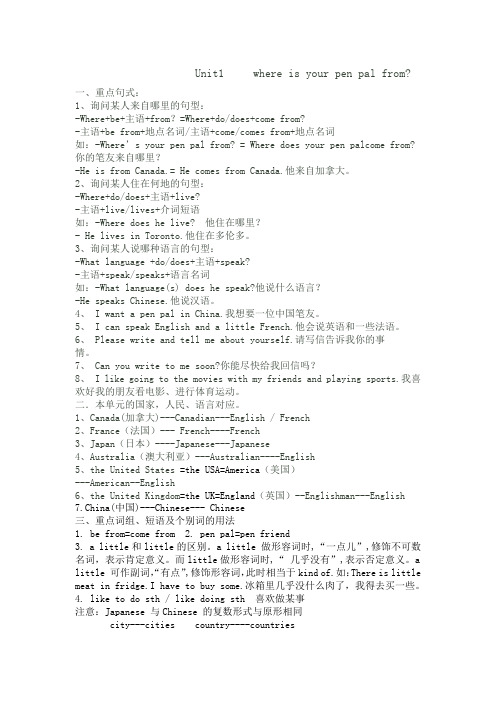
Unit1 where is your pen pal from?一、重点句式:1、询问某人来自哪里的句型:-Where+be+主语+from?=Where+do/does+come from?-主语+be from+地点名词/主语+come/comes from+地点名词如:-Where’s your pen pal from? = Where does your pen palcome from?你的笔友来自哪里?-He is from Canada.= He comes from Canada.他来自加拿大。
2、询问某人住在何地的句型:-Where+do/does+主语+live?-主语+live/lives+介词短语如:-Where does he live? 他住在哪里?- He lives in Toronto.他住在多伦多。
3、询问某人说哪种语言的句型:-What language +do/does+主语+speak?-主语+speak/speaks+语言名词如:-What language(s) does he speak?他说什么语言?-He speaks Chinese.他说汉语。
4、 I want a pen pal in China.我想要一位中国笔友。
5、 I can speak English and a little French.他会说英语和一些法语。
6、 Please write and tell me about yourself.请写信告诉我你的事情。
7、 Can you write to me soon?你能尽快给我回信吗?8、 I like going to the movies with my friends and playing sports.我喜欢好我的朋友看电影、进行体育运动。
二.本单元的国家,人民、语言对应。
1、Canada(加拿大)---Canadian---English / French2、France(法国)--- French----French3、Japan(日本)----Japanese---Japanese4、Australia(澳大利亚)---Australian----English5、the United States =the USA=America(美国)---American--English6、the United Kingdom=the UK=England(英国)--Englishman---English7.China(中国)---Chinese--- Chinese三、重点词组、短语及个别词的用法1. be from=come from2. pen pal=pen friend3. a little和little的区别。
七年级下册英语书翻译

七年级下册英语书翻译(人教版新目标)Unit1Where’syourpenpalfrom?SectionB3aDearStudent,Toront,Canada,ChinaChina'United KingdomAustralia'''stoodifficult!Canyouwritetomesoon?Bob亲爱的同学:我的名字叫鲍勃。
我住在加拿大的多伦多。
我想交一个中国笔友。
我为中国是个很有趣的国家。
我14岁,是十一月出生的。
我说英语,还能讲一点法语。
我有一个哥哥叫保罗,还有一个妹妹萨拉。
他们有英国和澳大利亚的笔友。
我喜欢与朋友们一起看电影,做体育运动。
在学校里最喜欢上体育课。
它非常有意思。
但是我不喜欢数学。
他太难了!你能尽快给我回信吗?鲍勃Unit2Where’sthepostoffice?SectionB3aWelcometotheGardenDistrictTurnleftontheFirstAvenueandenjoythecity'欢迎来到花园区在第一大街向左转,来享受城市宁静的街道和小公园。
步行穿过中心大道上的公园,公园的对面是一家老式的旅馆.紧挨着旅馆的是一座带有一个有趣的花园的小房子。
这就是你花园旅行的开始。
Bridge StreetBridge Street'sacrossfromthepostoffice.来参观大桥街大桥街是一个玩得开心的好地方。
这是一条非常繁忙的街道。
你可以在公园弹吉他。
它就在那儿。
在饭店和邮局之间。
如果你饿了,你可以在超市买一些吃的,它在邮局的对面。
Selfcheck3SDearfriend,亲爱的朋友:我知道你下个星期就会到达。
让我来告诉你来我家路吧。
从飞机场乘出租车,经过一个位于你右边的银行,然后沿长街继续走,穿过第六大街、第七大街和第八大街。
当你看到一个大超市时,向左拐。
然后沿着大桥街继续走,在新公园处左拐。
七年级下册英语复习笔记

七年级下册英语复习笔记U n i t1W h e r e’s y o u r p e n p a l f r o m?一.W h e r e+b e+主语+f r o m?=W h e r e+d o/d o e s+主语+c o m e f r o m?W h e r e a r e y o u f r o m?=W h e r e d o y o u c o m e f r o m?B e f r o m=c o m e f r o m联系动词实义动词例:S t o n e i s c o m e f r o m C h i n a.(×)注:b e动词与实义动词永远不能连用。
二.国家国人国人复数语言首都(t h e p e o p l e R e p u b l i c s o f C h i n a)B e i j i n g C a n a d a O t t a w a F r a n c e P a r i s J a p a n T o k y o U n i t e d S t a t e s o f A m e r i c a A m e r i c a(t h e u n i t e d K i n g d o m)E n g l a n d E n g l i s h m a n E n g l i s h m e n E n g l i s h L o n d o nA u s t r a l i a A u s t r a l i a n A u s t r a l i a n s E n g l i s h C a n b e r r a三.W h e r e d o e s h e l i v e?H e l i v e s i n B e i j i n g.W h e r e对地点提问的秘诀是:一定,二改,三组合一定,确定疑问词W h e r e二改,将原句改为一般疑问句,将第一人称改为第二人称三组合,把前面的部分及后面部分组合例:I l i v e i n K u n m i n g(画线提问)W h e r e d o y o u f r o m?L i v e是一个不及物动词及物动词后可以直接加宾语,不需要加任何介词。
七年级英语下册第一第二单元词汇用法汇总
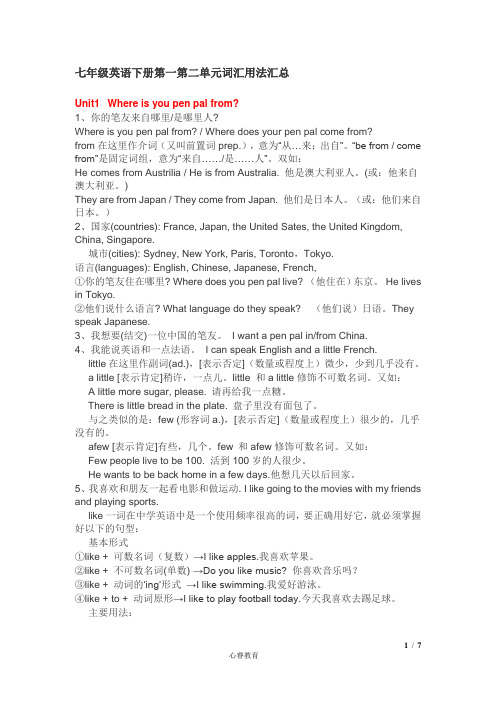
七年级英语下册第一第二单元词汇用法汇总Unit1 Where is you pen pal from?1、你的笔友来自哪里/是哪里人?Where is you pen pal from? / Where does your pen pal come from?from在这里作介词(又叫前置词prep.),意为―从…来;出自‖。
―be from / come from‖是固定词组,意为―来自……/是……人‖。
双如:He comes from Austrilia / He is from Australia. 他是澳大利亚人。
(或:他来自澳大利亚。
)They are from Japan / They come from Japan. 他们是日本人。
(或:他们来自日本。
)2、国家(countries): France, Japan, the United Sates, the United Kingdom, China, Singapore.城市(cities): Sydney, New York, Paris, Toronto,Tokyo.语言(languages): English, Chinese, Japanese, French,①你的笔友住在哪里? Where does you pen pal live? (他住在)东京。
He lives in Tokyo.②他们说什么语言? What language do they speak? (他们说)日语。
They speak Japanese.3、我想要(结交)一位中国的笔友。
I want a pen pal in/from China.4、我能说英语和一点法语。
I can speak English and a little French.little在这里作副词(ad.),[表示否定](数量或程度上)微少,少到几乎没有。
a little [表示肯定]稍许,一点儿。
七年级英语Where_is_your_pen_pal_from教案

新目标英语七年级下册教案Unit1 Where is your pen pal from?Topic:Countries, nationalities, and languagesFunctions:Talk about countries, nationalities and languagesAsk and tell about where people liveStructure:Where's/Where're ...from?Where does/do ...from?What questions----What language does/do ...speak?Target language:Where is she from? She is from....Where does she live? She lives in....What language does she speak? She speaks....Vocabulary:words about countries, languagesTeaching design:The whole unit needs 5 periods, 4 for new lessons and 1 for testPeriod 1 ( 1a----Grammar Focus )Key points:Where is your/John's pen pal from? He/She is from...Where does he/she live? He/She lives in....(Homework for preview)Pre-task:Let the Ss give themselves pen pals and they should write down their pen pals' information, such as their names, countries and cities they live even the language they speak.T can give the Ss an example meanwhile T gives the different countries which can be used by the Ss. T gives the Ss Chinese words for the countries, they are following: 加拿大,法国,日本,美国,澳大利亚,新加坡,英国,中国( The Ss can look them up in the dictionary if they are new for them)The example is following:Name: Curry MurayAge: 75From(Nationality): the United StatesCity: New YorkLanguage: EnglishTeaching Steps:Key points:Where is your/John's pen pal from? He/She is from...Where does he/she live? He/She lives in....(Homework for preview)Pre-task:Let the Ss give themselves pen pals and they should write down their pen pals' information, such as their names, countries and cities they live even the language they speakT can give the Ss an example meanwhile T gives the different countries which can be used by the Ss. T gives the Ss Chinese words for the countries, they are following: 加拿大,法国,日本,美国,澳大利亚,新加坡,英国,中国( The Ss can look them up in the dictionary if they are new for them)The example is following:Name: Curry MurayAge: 75From(Nationality): the United StatesCity: New YorkLanguage: EnglishTeaching Steps:Step 1 Leading-inThe information of the teacher's own pen pal's information."I have a pen pal. His name is Curry Muray. He is from the United States. Do you have a pen pal? Where is your pen pal from? What's your pen pal's name?"Different students say the information about their own pen pals. T should choose the different countries. T writes the different countries on the Bb(both Chinese and English)Step 2 LearningSection A 1a Learn the new words on the Bb. The new words are: pen pal; Canada; France; Japan; the United States(the US/theUSA/America); Australia; Singapore; the United Kingdom(theU.K./Great Britain/England)Pay attention to the pronuciation of the new words.Step 3 Listening1b Listen and circle the countries in 1a they learnedStep 4 CompetitionTwo groups of students to write the new words to see which group does better. First write down the Chinese words with looking at theEnglish meanings, then write down the English words with looking at the Chinese meanings.(This step is a memory game. It can help the Ss consolidate the new words they learned)Step 5Pairwork1c Practise the following conversation:---Do you have a pen pal? ---Yes, I do.---Where's your pen pal's from? ----He/She is from ....(Write it down on the Bb)First T has a conversation with one student as an example then let the Ss practise in pairs. At last let several pairs do it again in class.Step 6Leading-inRevise the countries names with looking at the Bb. Then T writes down the city names on the Bb. Let the Ss try to find out which countries the cities are in. The city names are following:Toronto; Paris; Tokyo; New York; Sydney; Singapore; London;Step 7 Learning2a Learn the city names together with the whole class just like Step 22b Listen and circle the cities and countries2c Listen and complete the chartHave a similar competition to consolidate the new words in this part.Step 8PairworkT has a conversation with one student like the following:---Do you have a pen pal? ---Yes, I do.---What's your pen pal's name? ---His/Her name is....---Where is your pen pal from? ---He/She is from...---Where does he/she live? ---He/She lives in....(Write it down on the Bb)Let the Ss practise after the T's example in pairs then several pairs do it in class.Step 9ExerciseMy pen pal is from Australia.(划线提问)John's pen pal is from Japan. (划线提问)He lives in Paris. (划线提问)Homework:Read and copy the new words .Copy the sentences in Grammar FocusMake up the questions about Jodie in 2c The questions are:Does Jodie have a pen pal? Where is Jodie's pen pal from? Where does he/she live? What's his/her name?(This one can be chosen by themselves)Unit 2 Where's the post office?Language goalThis unit students leam to ask for and give directions(方向) on the street.New languageIs there a bank near here? Yes, there's a bank on Center Street, Where's the supermarket? It's next to the library.Is there a pay phone in the neighbhood?Yes, it's on Bridge Street on the right.locations in the neighborhood such as post office, hotel,video arcade. Descriptive words such as new, old, dirty, clean.Descriptions of location such as across from, next to,BetweenRecycled languageWhat are you doing?Do you want to ...?Section AAsk two rows of three students each to stand facing each other in the front of the classroom. Point to students standing in front and ask the class to repeat the questions and answers.Example 1Teacher: Where'sYang Li? (Point to two students standing beside each other.) Yang Li is next to Li Peng.Example 2Teacher: Where's Zheng Wen? (Point to two students in different lines facing each other.)Zheng Wen is across from Sheng Lin. Example 3Teacher: Where's Lin Jiahui? (Point to one student standing betweentwo other students.) Lin Jiahui is between Sheng Lin and Li Dai.la This activity introduces the key vocabulary.Focus attention on the picture. Ask students to name as many of the places they see in the picture as they can.Then name all the places and ask students to repeat.Point out the numbered list of words. Say each one and ask students to repeat.Then ask students to match each word or phrase on the list with one of the pictures. Say, Write the letter of each place in the picture next to the correct word or words on the list. Point out the sample answer f.Check the answers.1b This activity gives students practice listening to and understanding the target language.Point out the buildings and other locations in the picture. Say the name of each one to the class.Say, Now I will play recordings of three conversations. Listen carefully and circle the picture of each place you hear on the tape..Play the recording the first time. Students only listen.Play the recording a second time. This tine ask students to listen and circle the items they hear on the picture.Correct the answers.These items should be circle:video arcade, post office, supermarket.Tapescript(录音稿)Convernation 1A: Is there a video arcade on Fifth Avenue?B: Yes, there is.Conversation 2A: Is there a post office near here?B: Yes, there is. There's one on Bridge Street.Conversation 3A: Is there a supermarket on Center Street?B: No, there isn't.1C This activity provides guided oral practice using the target language.Point to the different locations shown in the picture.Ask different students to name each one. If necessary,say the name and ask the student to repeat.Point to the question and answer In the example conversation and ask a pair of students to read the conversation to the class. Ask other pairs of students to repeat the activity if you wish.Ask students to work in pairs. Say, First one person asks a question and then the other person takes a turn.Demonstrate(示范)the activity. Point to the picture and ask. Is there a post office near here? Then choose a student to answer. Guide the student to say, Yes,there's a post office on Bridge Street. As students work, move around the room and check progress(进展情况). Help students understand how to locate things on the map, if necessary.Ask several students to say some of their questions and answers for the class.教学后记:教学方法有问题?教了这么多年的英语,总幻想有一种方法,能让学生轻轻松松把英语学好。
人教英语七年级下册各单元习题精炼及答案(精华版)

( )13. That tennis ball is one of ___________.
A. Jane fatherB. Jane’s father
C. Jane father D. Jane’s father’s
A. a. B. an. C. the D. /
三.选择下面所给单词的适当形式填空。
mean little print sit wait care lie fifty friend difference
1. There are at _________ 60 students in their class.
Simon:My name is Simon. I’m calling ____3___ Shanghai.
Neil’s mother:Hello, Simon. I’m ___4____,Tommy is still at school. Can I ___5___ a message ___6___ you?
A. with B. toC. and
10.Foxes can count numbers. So people think they are _____.
A. scary B. interesting C. intelligent
二、选择正确的词填空。
favorite, do, are, does, animals, let, let’s, come
4._____ pandas from China?
A. Are B. IsC. Do
5.Students ______ nine hours a day.
人教版七年级英语下册各单元考点总结

They are kind of/very shy.他们有点儿害羞/非常害羞。
二、考点解析
1.Let’s do sth, let’s=let us 让我们做…… 人称代词用宾格 Let’s 之后跟动词原形。
What are you doing? 你在干什么 I am doing my homework. 我正在做我的家庭作业。
Where are you swimming? 你在哪里游泳 I am swimming at the pool. 我在水池里游泳。
Who is the boy talking to? 这个男孩在对谁说话 He is talking to his teacher.他在对他的老师谈话。
暖的/冷的/凉爽的。 2. How’s
it going? 近况如何 –Great./Not bad/pretty good/ Just so so/ terrible/Boring.很棒/不错/相当好/一般般
/糟糕/无聊的 3. Is Aunt Wang there? 王阿姨在那儿吗 –Yes,she is 是的她在。 /No,she isn’t.不,她不再。
What are you doing?你在干什么 I’m watching TV.我在看电视。
Do you want to go swimming?你想去钓鱼吗 Yes, I do. No, I don’t.
When do you want to go? 你什么时候想去 At three o’ clock.在三点钟。
3.give sb sth=give sth to sb 给某物给某人 4. get sth from sb 从某人出得到某物
七年级英语(下)词汇大全(音标版)

七年级(下)Unit1Where’s your pen pal from?1. pal [ ]2. Canada [ ]3. France [ ]4. Japan [ ]5. Australia [ ]6. singapore [ ]7. country [ ]8. Sydney [ ]9. New York [ ]10. Paris [ ]11. Toronto [ ]12. Tokyo [ ]13. live [ ]14. language [ ]15. Japanese [ ]16. world [ ]17. French [ ]18. like [ ]19. dislike [ ]20. Jodie [ ]21. Andrew [ ]22. Lucy [ ]23. Sarah [ ]24. King [ ]25. Sam [ ]26. Julie [ ] Unit 2 Where’s the post office?27. post [ ]28. office [ ]29. library [ ]30. restaurant [ ]31. bank [ ]32. supermarket [ ]33. street [ ]34. pay [ ] 35. park [ ]36. avenue [ ]37. center [ ]38. bridge [ ]39. mail [ ]40. there [ ]41. near [ ]42. across [ ]43. next [ ]44. between [ ]45. front [ ]46. behind [ ]47. neighborhood [ ]48. just [ ]49. straight [ ]50. turn [ ]51. left [ ]52. down [ ]53. right [ ]54. open [ ]55. market [ ]56. clean [ ]57. quiet [ ]58. dirty [ ]59. house [ ]60. welcome [ ]61. garden [ ]62. district [ ]63. enjoy [ ]64. walk [ ]65. through [ ]66. beginning [ ]67. tour [ ]68. visit [ ]69. place [ ]70. fun [ ]71. if [ ]72. hungry [ ]73. arrive [ ]74. way [ ]75. take [ ]76. taxi [ ]77. airport [ ]78. pass [ ]79. hope [ ]80. yours [ ]81. Nancy [ ] Unit 3Why do you like koalas?82. koala [ ]83. tiger [ ]84. elephant [ ]85. dolphin [ ]86. panda [ ]87. lion [ ]88. penguin [ ]89. giraffe [ ]90. zoo [ ]91. cute [ ]92. map [ ]93. smart [ ]94. animal [ ]95. box [ ]96. kind of [ ]97. south [ ]98. Africa [ ]99. bingo [ ] 100. ugly [ ] 101. clever [ ] 102. friendly [ ] 103. beautiful [ ] 104. shy [ ] 105. other [ ] 106. grass [ ] 107. sleep [ ] 108. during [ ] 109. leaf [ ] 110. lazy [ ] 111. meat [ ] 112. relax [ ] 113. Julia [ ] 114. Henry [ ] 115. Molly [ ] 116. Larry [ ] Unit 4 I want to be an actor. 117. shop [ ] 118. doctor [ ] 119. reporter [ ] 120. policeman [ ] 121. waiter [ ] 122. hospital [ ] 123. now [ ] 124. star [ ] 125. policeman [ ] 126. nurse [ ] 127. money [ ] 128. give [ ] 129. get [ ] 130. wear [ ] 131. uniform [ ] 132. sometimes [ ] 133. in [ ] 134. dangerous [ ] 135. thief [ ] 136. late [ ] 137. out [ ] 138. talk [ ] 139. station [ ] 140. police [ ] 141. newspaper [ ] 142. hard [ ] 143. as [ ]144. at [ ] 145. summer [ ] 146. story [ ] 147. magazine [ ] 148. young [ ] 149. play [ ] 150. news [ ] 151. children [ ] 152. international [ ] 153. teach [ ] 154. skill [ ] 155. sir [ ] 156. mada [ ] 157. Susan [ ] 158. Betty [ ] 159. Karen [ ] 160. Frank [ ] Unit 5I’m watching TV.161. clean [ ] 162. read [ ] 163. on [ ] 164. apartment [ ] 165. sure [ ] 166. wait [ ] 167. toy [ ] 168. west [ ] 169. activity [ ] 170. shop [ ] 171. mall [ ] 172. pool [ ] 173. camera [ ] 174. bird [ ] 175. Steve [ ] Unit 6 It’s raining.176. rain [ ] 177. windy [ ] 178. cloudy [ ] 179. sunny [ ] 180. sunny [ ] 181. snow [ ] 182. weather [ ] 183. Moscow [ ] 184. Boston [ ] 185. cook [ ] 186. study [ ] 187. bad [ ] 188. terrible [ ] 189. pretty [ ] 190. hot [ ] 191. cold [ ] 192. cool [ ] 193. warm [ ] 194. humid [ ] 195. vacation [ ] 196. lie [ ] 197. beach [ ] 198. group [ ] 199. cool [ ] 200. surprised [ ] 201. heat [ ] 202. relaxed [ ] 203. winter [ ] 204. scarf [ ] 205. everyone [ ] 206. man [ ] Review U1-6207. describe [ ] 208. direction [ ] 209. unit [ ] 210. most [ ] 211. following [ ] 212. improve [ ] 213. Kelly [ ] Unit 7 What does he look like?214. hair [ ] 215. curly [ ] 216. straight [ ] 217. tall [ ] 218. medium [ ] 219. height [ ] 220. thin [ ] 221. heavy [ ] 222. build [ ] 223. like [ ] 224. always [ ] 225. captain [ ] 226. team [ ] 227. popular [ ] 228. blonde [ ] 229. good-looking [ ] 230. bit [ ] 231. joke [ ] 232. never [ ] 233. stop [ ] 234. brown [ ] 235. person [ ] 236. beard [ ] 237. glasses [ ] 238. look [ ] 239. remember [ ] 240. pop [ ] 241. singer [ ] 242. say [ ] 243. nobody [ ] 244. Pete [ ] 245. Cathy [ ] 246. Johnny [ ] 247. Dean [ ] 248. Ruth [ ] 249. Gloria [ ] 250. Teeny [ ] 251. Hugeman [ ] 252. Dreamer [ ] 253. Wiseman [ ] Unit 8 I’d like some noodles. 254. would [ ] 255. noodle [ ] 256. beef [ ] 257. mutton [ ] 258. cabbage [ ] 259. potato [ ] 260. special [ ] 261. drink [ ] 262. large [ ] 263. size [ ] 264. bowl [ ] 265. juice [ ] 266. dumpling [ ] 267. porridge [ ] 268. tea [ ] 269. rice [ ] 270. soup [ ] 271. onion [ ] 272. fish [ ] 273. reason [ ] 274. menu [ ] Unit 9 How was your weekend? 275. was [ ] 276. did [ ] 277. went [ ] 278. visit [ ] 279. test [ ] 280. stay [ ] 281. have [ ] 282. practice [ ] 283. regular [ ] 284. verb [ ] 285. irregular [ ]286. present [ ] 287. past [ ] 288. mountain [ ] 289. geography [ ] 290. spend [ ] 291. yesterday [ ] 292. No. [ ] 293. middle [ ] 294. most [ ] 295. had [ ] 296. saw [ ] 297. talk [ ] 298. wrote [ ] 299. song [ ] 300. sit [ ] 301. sat [ ] 302.down [ ] 303. cat [ ] 304. wasn’t [ ] 305. no [ ] 306. anything [ ] 307. suggestion [ ] 308. Carol [ ] Unit 10 Where did you go on vacation? 309. camp [ ] 310. museum [ ] 311. guide [ ] 312. central [ ] 313. exam [ ] 314. really [ ] 315. rainy [ ] 316. were [ ] 317. fantastic [ ] 318. unfriendly [ ] 319. awful [ ] 320. delicious [ ] 321. expensive [ ] 322. crowded [ ] 323. cheap [ ] 324. water [ ] 325. cry [ ] 326. corner [ ] 327. make [ ] 328. made [ ] 329. feel [ ] 330. walk [ ] 331. back [ ] 332. decide [ ] 333. wall [ ] 334. palace [ ] 335. square [ ] 336. make [ ] 337. classmate [ ] 338. discuss [ ] 339. report [ ] 340. sex [ ] 341. Brad [ ] 342. Kevin [ ]Unit 11 What do you think of game shows? 343. soap [ ] 344. sitcom [ ] 345. nothing [ ] 346. ha [ ] 347. stand [ ] 348. mind [ ] 349. king [ ] 350. fact [ ] 351. culture [ ] 352. host [ ] 353. agree [ ] 354. sunglasses [ ] 355. belt [ ] 356. wallet [ ] 357. by [ ]358. fashion [ ] 359. said [ ] 360. article [ ] 361. put [ ] 362. idea [ ] 363. colorful [ ] 364. Taylor [ ] 365. Rice [ ] Unit12Don’t eat in class.366. rule [ ] 367. hallway [ ] 368. classroom [ ] 369. fight [ ] 370. Ms [ ] 371. outside [ ] 372. dining [ ] 373. hall [ ] 374. else [ ] 375. gym [ ] 376. Dr [ ] 377. by [ ] 378. wash [ ] 379. later [ ] 380. loudly [ ] Review 7-12381. accessory [ ] 382. snow [ ] 383. order [ ] 384. opinion [ ] 385. form [ ]。
整理后Unit1Where's your pen pal from?语法及练习

七英下第一单元Where is your pen pal from ?复习资料语法1.be from / come from… 来自1)---你来自何处? ---我来自巴黎。
---Where do you come from? /Where are you from?---I come from / am from Paris.2.like的用法:like sth.1)我妈妈喜欢吃苹果。
My mother likes apples.like to do sth. / like doing sth. 喜欢做某事2)我不想骑车去那里。
I don’t like to go there by bike.3.be busy with sth. 忙于某事1)我妈妈正忙着做家务。
My mother is busy with the housework.be busy doing sth. 忙于做某事2)他正忙着写作业。
He is busy doing his homework.4.let sb. do1)让我帮你打扫教室吧。
Let me help you clean the classroom.5.help sb. with sth. 帮助某人某事1)他经常放学后帮我数学。
He often helps me with my math after school.help sb(to) do sth. 帮助做某事2)我们在家必须帮着做家务。
We must help (to) do the housework at home.help oneself (to sth)自己取(…食用)5)请随便吃些水果吧。
Please help yourself to some fruit.6.be good at +sth/doing sth1)他擅长足球。
He is good at football.2)她擅长唱歌跳舞。
初一英语下unit1丽丽的

初一英语下unit1丽丽的unit1where’syourpenpalfrom?一、从哪里来?句型询问“某人居住在什么地方?”where+助动词+主语+live?live是不及物动词,接地点是需要用介词in/at。
住在较大地方用in,住在较小地方用at。
你叔叔住在哪里?你叔叔住在哪里?他住在日本。
他住在日本。
3、什么语言?句型询问“某人讲什么语言?”用“whatlanguagedo/doessb.speak?”eg.-whatlanguagedo/doesyourteacherspeak?-她说英语。
她说英语。
4、词义区分1.speak动词意为“讲,说某种语言”(强调开口说话.发言的动作,跟某种语言作宾语是是及物动词)”Talk的意思是“Talk”(强调双方之间的对话)。
Talk to/with sbcell的意思是“tell”(后跟双宾语或复合宾语)tell bsth/tellsh。
会后,她与学生们交谈,告诉他们这些帮助非常重要。
在会议上发言后,他对学生们说,他所说的非常重要。
2.很少;很少;例如:瓶子里有一些水。
瓶子里有一些水。
瓶子里几乎没有水。
他有几个朋友。
他有一些朋友。
他有几个朋友。
他有几个朋友。
他有几个朋友。
他几乎没有朋友我喜欢踢足球。
ilikevisitingfriendsonsundaysandiliketovisitjoanthissunday.我喜欢星期天拜访朋友,这个星期天我想去拜访琼。
4.gotothemovies“去看电影”(goto+名词常表示去做与名词相关的事情)gotoschool去上学gotoaparty去参加聚会gotoashow去看表演第一单元一用所给词的正确形式填空。
1.-whatlanguagedoeshespeak?-he(speak)japanese.2.mypenpalisfrom(french).3.wedon’twant(play)soccernow.4.doe shespeak(japan)5.tim(live)in二单项选择题。
